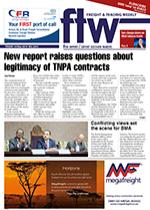The corporatisation of Transnet National Ports Authority (TNPA) and claims that it is running the country’s ports unlawfully because it is a division rather than a subsidiary of the parastatal, have come under the spotlight after a court ruling that a report by the Ports Regulator of South Africa on the matter be made public. In the report, the Regulator highlighted Section 3 (2) of the National
Ports Act of 2005 that states TNPA cannot be a division of Transnet. The Act explicitly requires the TNPA to be converted into a private company subsidiary. Other sections of the Act allow the Minister of Public Enterprises, Pravin Gordhan, the right to convert it into an independent and public entity separate from Transnet. While the ruling came into effect in 2006, no moves have been made
to date to make TNPA a subsidiary of Transnet rather than a division. Yet it continues to function as a corporatised entity. This has raised questions around the legality of TNPA running the country’s eight commercial ports with some stakeholders saying that every contract signed since 2006 is now open to challenge. The report, which highlights some of the concerns around TNPA not being a separate entity
and the impact on the port system and trade in general, was drawn up in 2016 for the then Minister of Transport. Since then it has remained confidential, however it was recently brought to the fore in a court case brought by Siyakhuphuka Investment Holdings in the KZN Natal High Court. Siyakhuphuka, the TNPA and the Regulator have all been at loggerheads over developments at the Port of Richards Bay since 2008. Siyakhuphuka says it
proposed additions to the port that were rejected only to be implemented by TNPA the following year. Siyakhuphuka also asked for access to the report, but this was denied because it was confidential. The matter then went to court where the court found in their favour and the Regulator has had to give them the report. In the meantime a court case is ongoing over infrastructural upgrades at the Port of Richards Bay.
According to Ports Regulator Mahesh Fakir, there have been no attempts to keep the issue of corporatisation of the ports authority secret and it has been a topic of conversation for several years – addressed in Parliament and on various platforms. “Our position was never to keep this issue a secret, but the report was confidential, and for the attention of the minister,” he told FTW. He confirmed that they had since made it public in accordance with the court order. “I don’t think it is in anyone’s best interests to undo or destroy what we have built up in our port system, but rather facilitate and make things work better,” he said when asked about the claims that TNPA was running the country’s ports unlawfully. “Also, one must not forget that TNPA cannot corporatise itself. It cannot incorporate itself as a Pty (Ltd). That has to come from the Minister of Public Enterprises as the sole
shareholder of Transnet and all its divisions.” And, said Fakir, this was a matter currently under consideration by Gordhan. In a letter to the Ports Regulator dated November 29 last year, acting directorgeneral Thuto Shomang said the Minister was considering implementing Section 3 (2) of the National Ports Act. “The decision will be informed by an assessment of the impact of the implementation of the Act,” reads the letter. Mike Walwyn from the South African Association of Freight Forwarders (Saaff) said the issue had been a concern ever since the promulgation of the Act which specifically stated that TNPA must be corporatised. “Over the years, the question has been raised in various forums, but
no concrete plans were ever disclosed, and the impression has been that this is a very problematic issue for Transnet. “We believe it is something that should happen sooner rather than later. Quite apart from the questionable validity of every contract signed in the last 13 years, there is the question of transparency. “The current divisionalised structure doesn’t allow for interrogation of the extent to which TNPA may or may not be subsidising other Transnet operations. And the regulatory mechanism provides that TNPA must exercise oversight over port terminals in terms of their efficiencies and pricing, but in practice this cannot be easy when TNPA and TPT are both divisions of the same company.”
Moshe Motlohi, general manager of corporate affairs and external relations at TNPA, said they were aware of the report and acquainted with its contents. “Importantly, we wish to state at the outset that there is quite simply nothing unlawful in the manner TNPA conducts its business. It operates squarely within the confines of the law, as much as its relationship and/ or dealings with Transnet are strictly in accordance with the applicable legal and corporate governance framework that addresses itself to the peculiar regulatory position pertaining to TNPA,” he said. According to Motlohi, the report merely expresses the opinion of its authors. “It does not and cannot constitute legal findings that are binding on any external party, including TNPA or Transnet. TNPA is satisfied that it has structured its relationship and governance arrangements with Transnet in a manner consistent with the regulatory framework contemplated in the law.”
There is quite simply nothing unlawful in the manner TNPA conducts its business. – Moshe Motlohi
New report raises questions about legitimacy of TNPA contracts
10 May 2019 - by Liesl Venter
0 Comments
FTW 10 May 2019

10 May 2019
10 May 2019
10 May 2019
10 May 2019
10 May 2019
10 May 2019
10 May 2019
10 May 2019
10 May 2019
Border Beat
07 Oct 2024
Featured Jobs
New
